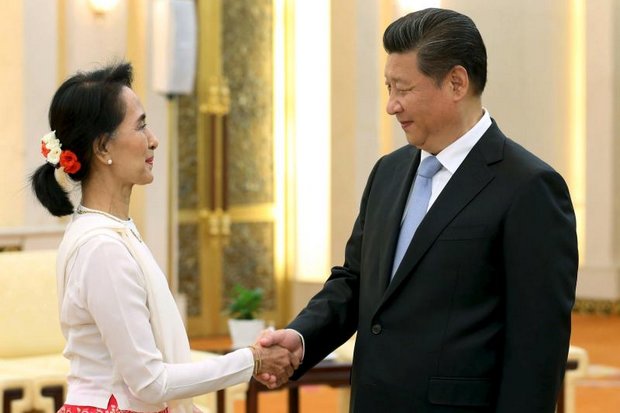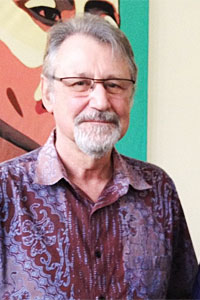
Aung San Suu Kyi is to arrive today in Beijing on a four-day official visit, which both sides hope will strengthen their relationship. Relations between the two countries have seesawed in the past few years, after the former military leader Than Shwe stood down. Bilateral economic ties, regional security and Myanmar's peace process will dominate the agenda, according to diplomats in Nay Pyi Taw and Beijing.
It is a crucial visit for Myanmar's foreign minister -- who is also the state counsellor, so effectively the country's prime minister -- as relations with China have been critical over the last three decades. According to diplomatic sources in Nay Pyi Taw, Ms Suu Kyi was adamant that she should visit Beijing before her scheduled trip to the US next month.
"China is our most important neighbour, so I can't afford to do anything to upset them," she told this writer in early 2003. And according to sources close to the Myanmar leader, her views have not changed.
Diplomats in both capitals are being tight-lipped about the agenda -- other than to say the Chinese premier Li Keqiang will host her visit. But she is also expected to meet the Chinese President Xi Jingping on this trip -- as she did last year when she visited as the leader of the then opposition party, the National League for Democracy (NLD). China's relations with Nay Pyi Taw are so important to Beijing, that all efforts will be made to show the visiting Myanmar leader how important their bilateral ties are. And there are critical security issues that need to be mulled over by both sides.

Larry Jagan is a Myanmar specialist and former BBC World Service News Editor for the region.
There is no doubt that economic issues will top the agenda. China is Myanmar's biggest foreign investor, and Chinese businesses are expanding rapidly while western investors are cautious about the country's economic and political stability. Beijing is also a major donor, and provides substantial soft loans for infrastructural projects. They have also offered millions of dollars to support Myanmar's peace process.
While most analysts and observers believe the controversial US$3.6 billion (about 125 billion baht) Myitsone Dam for hydro-electricity generation -- and suspended by the previous government of Thein Sein -- will be a key Chinese concern and feature prominently in discussion during the visit, it is not in fact one of Beijing's top priorities. China understands that economically it no longer makes sense. It is a major cause of resentment, especially in the region around the dam site -- near the Chinese border.
The only issue is compensation, according to sources in Beijing. That of course remains a thorn in the side of the currently impoverished Myanmar government, who would be loath to pay for previous government's mistakes. But Beijing seems confident a compromise will be worked out that is acceptable to both sides.
In the end Myanmar holds all the cards, according to Chinese sources, as the last thing Beijing wants is for construction to resume. In fact the Myanmar government is also keen to find a face-saving way of putting the issue to rest. A week ago Myanmar President Htin Kyaw announced the formation of a committee to review all hydropower projects in Kachin state, including the Myitsone dam.
But as Ms Suu Kyi will discover on her visit, the China's top priority is the Kyuakphu special economic zone. The oil and gas pipelines and the fast speed train line from there to Kunming are already important economic investments. The Chinese have being trying to convince the Myanmar government to make the economic zone a government-to-government project, as with Thilawa (Japan) and Dawei (Thailand). The previous government effectively, though reluctantly, gave them the concession.
At issue is the joint venture to build the deep-sea port there. Originally it seemed as though Chinese companies had won the tender, but now this seems to be in doubt as a major Thai firm is pushing hard to be involved. This port would be crucial for the rigging and supplying of offshore oil and gas operations. But for Beijing it is far more important as a transport and communications link from China's south to the Andaman Sea. It is a critical part of China's strategic vision -- one road, one belt, better known as the new Silk Road.
For Ms Suu Kyi, two weeks before the planned 21st Century Panglong Conference with the country's ethnic minorities and rebel armies, the peace process is likely to be top of her agenda. Several of the major ethnic groups, all situated in the border areas with China -- the Wa and Mongla group, and to a lesser degree the Kachin -- are closely allied with China. Beijing's attitude could be crucial to their participation and active involvement in the process.
Beijing has prompted them to be proactive. As a result both groups met Ms Suu Kyi in Nay Pyi Taw two weeks ago -- and after further discussion with government negotiators have agreed to participate in the planned peace summit later this month. China's active support for the peace process will make it easier for the new initiative to move forward.
While the sensitive border areas will generally be a significant theme in talks between the two neighbours, there are also major strategic issues at stake too. Of course Beijing will want to convince Ms Suu Kyi of their position on the South China Sea. But Beijing is also worried about Myanmar's apparent efforts to break free from their dependence on China.
The Chinese are worried about this, especially the military commander-in-chief, Senior General Min Aung Hlaing's efforts to distance the military from their previous close relationship. When China's Minister of State Security Geng Huichang visited Nay Pyi Taw last month he effectively warned the army chief he was playing with fire, especially cosying up to the Russians. Ms Suu Kyi is certain to hear the same message -- though much more diplomatically.
